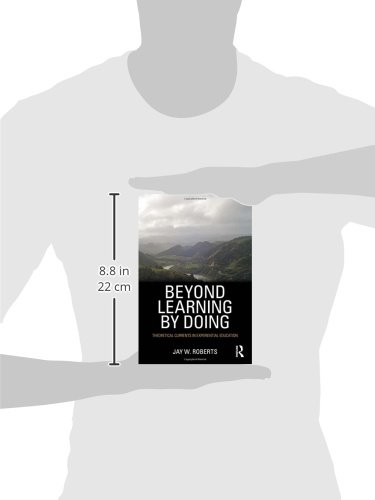



Full description not available
R**H
Worth digging for buried treasure.
My first review of this book gave it three stars and said..."There is some great content in this book. Sadly it is buried beneath a mass of overly complicated padding. If you have a background in philosophy, are really into Experiential Education theory or like spending time looking up long words for the hell of it then this book could be for you. If however you want to understand the theoretical background and potential future for experiential ed from a practitioners point of view then, in my opinion, look elsewhere."I decided to give it another more concerted effort however and on second reading I have to say I was able to get a lot more out of this book and I found some chapters really enlightening, especially the Critical Theory section. As a result of this I would emphasize that yes, there is some outstandingly good content in this book and the river metaphor holds up very well indeed.The padding however is an issue and if I had been able to engage with the content more easily I would give this book 5 stars. Maybe I am being picky but being repeatedly told that this book is not the place to go into depth with such and such a topic is so obvious as to be redundant, I only need to be told once. The preliminary explanation of how each topic is going to be explored is also unnecessary in my view. Perhaps that is just my learning style but I'd rather just cut to the chase. Taking notes whilst reading helped me extract what I thought was the buried treasure amidst the costume jewelry.Jay W. Roberts says he is working on another book aimed more at the practitioner and in my view this is what the field of experiential education most desperately needs. Fact is, I think most practitioners get into Experiential Ed by accident. They are outdoors people, social workers, teachers and community leaders first before they discover this methodology that they find really helps them to achieve their educational aims. For this group of people, a primer on Experiential Ed philosophy and theory is long overdue and I really look forward to it hitting the shelves.
A**M
If you love Educational Theory and Experiential Education
I just finished reading Jay Roberts book. I am currently a MEd graduate student and working an a research project on the transformative qualities of Environmental Education (EE). I found that this book was just what I needed to ground my beliefs, good and bad, about EE. However, I did find chapters 5 and 6 challenging to follow. Not because they were tough to read, but because there was so much good stuff to take in. I could only read 10-15 pages at a time, then I had to reflect on how my mind just got blown.Also, I have taught EE for 3 years. I have had a similar incident with a student like "Alvin." It is a story I see referenced far to often in the critique of EE. Thank you for including such a powerful narrative to shed light on how these experiences need to be better supported after students leave the EE facility and return home.THIS WAS A GREAT DENSE READ!!
D**N
He also does a good job of unifying the book through the metaphor of ...
I found the book to be well-written and concise in covering a wide range of theoretical approaches. Connections between historical thinkers or schools (e.g., Frankfurt, Dewey, transcendentalists) and practices today were made clearly and were illuminating. The last few chapters, dealing with both hope for the future through critical engagement, and a healthy pessimism about corporatization have really influenced my thinking in a variety of educational contexts. He also does a good job of unifying the book through the metaphor of a river and mixing theoretical with some personal stories, especially toward the end.
R**O
Great read
This book is essential for all and any practitioner interested in improving their understanding of experiences in the context of education and capacity building. It is well structured and well written book. The author provides a simple summaries at the end of each chapter which are life savers. Plenty of quotes and questions that inspire and get you thinking. I enjoyed reading this book immensely.
R**E
Not much substance
Little substance.
S**2
This book is recommended to those who want to move past superficial notions ...
Beyond Learning by Doing is a deeply considered, theoretical manuscript that explains (in very accessible writing) the foundational literature and social forces that have shaped what we know today as experiential education. This book is recommended to those who want to move past superficial notions of learning cycles and other recipe book-type ideas, and come to more profoundly interrogate their practice, with a view to improving it. Each time I open the book, I get something new from it.Beyond Learning by Doing is required reading on my masters level course in Experiential Education.
H**3
Five Stars
It was super helpful for my Outdoor Education experiential education class and paper!
Trustpilot
1 day ago
1 month ago